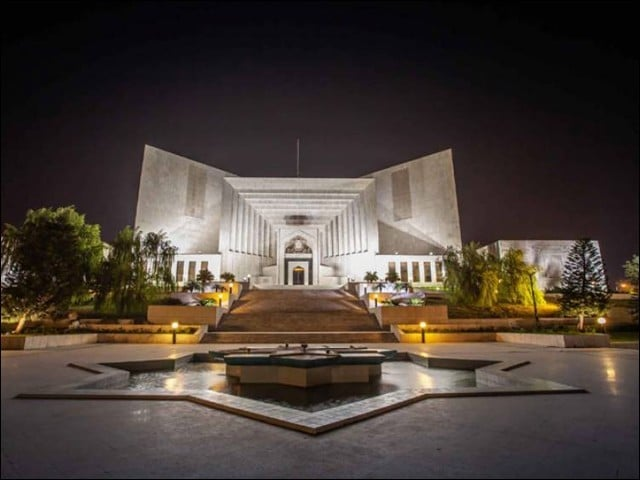
Supreme Court judge Justice Athar Minallah has pointed out that under Article 212 of the Constitution, people can claim damages against public servants over failure to fulfil their constitutional duties.
“In our Constitution, the framers have expressly created the right to claim remedies for tortuous acts of the government or any person in the service of Pakistan or other authority empowered by law to levy any tax or cess and any servant of such authority acting in the discharge of his duties as such servant," says Justice Minallah while referring Article 212 of the Constitution.
The judge issued an additional note over the state functionaries’ failure to hold elections within 90 days. Justice Minallah says that when on account of transgression, wrongful exercise of authority, abuse of power or reckless disregard for or neglect of public duties the constitutional rights are denied or breached, the citizen who has been wronged becomes entitled to claim various remedies including damages in common law for the tortuous acts.
The violation of a constitutional right is in itself an independent wrong and its violation is premised on the adage that there is no right without a remedy. In a few jurisdictions the right to seek a remedy for tortuous acts of public authorities is recognised in the Constitution while in most of the countries the jurisprudence has developed under the common law.
It is a unique and distinguishable feature of the Constitution because it expressly confers the right to claim public law remedies for tortuous acts of three categories of public authorities. It is a right which appears to have escaped the attention of the courts nor has it been invoked by a victim of wrongful exercise of public power.
It can create a formidable deterrence for violations of the Constitution and constitutional rights if the victims are enabled to effectively exercise this right. It is regrettable that no initiative has been made since the promulgation of the Constitution to establish special courts as contemplated by the framers.
Read CJP against using ‘sahib’ for public servants
Nonetheless, since this right has been created under the Constitution it cannot be denied nor made redundant on account of failure to establish the special courts to exercise exclusive jurisdiction as was intended by the framers. No right is without a remedy. When the Service Tribunal was not established or it becomes non-functional, the rights of the civil servants are not extinguished, rather they seek remedies from other forums including the High Courts.
The right to claim remedies against the tortuous acts of the three categories of public authorities cannot be denied to the citizens or other persons merely because a special court has not been established to exercise exclusive jurisdiction.
The jurisdiction of the courts of plenary civil jurisdiction and, in an appropriate case, the High Courts are not barred till such time that a special court conferred with exclusive jurisdiction has been established. "The constitutional right conferred on a person to claim remedies against tortuous acts of public authorities is of profound importance. It is one of the most effective means for a victim to vindicate the infringed right, hold public authorities to account and ensure that the public powers are not abused or wrongfully exercised.
The constitutionally created right empowers the people to police the misconduct of public authorities and the Government in addition to being compensated and vindicated for a wrong. "If effectively used and enforced it is a right that would encourage public participation in putting an end to abuse of powers and the impunity for violation of the Constitution and constitutional rights.
It is a right exercisable by the citizens and general public without being at the mercy of others such as the Federal Government for commencing criminal proceedings in case of the offence under Article 6. "It will be the duty of and an onerous challenge for the courts to ensure that the citizens or other persons effectively enforce this valuable right. Imagine if this right had been exercised by the people of Pakistan against the usurpers and collaborators for abrogating, subverting or holding the Constitution in abeyance.
The right has been expressly enshrined as a constitutional right and in such an eventuality the courts enjoy wide discretion to design or create a remedy to appropriately redress a constitutional right and to deter repetition of the tortuous acts in future.
Besides compensatory damages the court can, in addition, award exemplary or vindicatory damages, as the case may be. The criterion for assessment of damages in the case of vindication of a constitutional right is presumed general damages."
Read more Public servants’ social media restricted
"In the case in hand the people of Pakistan, particularly the registered voters, have been deprived of the most fundamental right to participate in the governance of the State through chosen representatives and obviously the right to vote in accordance with law. They are being governed by unelected caretakers in violation of the Constitution and their fundamental rights. They are victims of the wrongful exercise of public powers and reckless disregard for duties imposed under the Constitution and statutes upon the President, Governors and the Commission i.e the Commissioner and the members.
They are all in breach of their statutory duties. Their conduct and failure to discharge their constitutional duties has made them answerable to the people. They have exposed themselves to actions against their tortuous acts. It is the duty of public authorities to obey the law and exclusively serve the interests of the general public.
It is a duty of the courts to put an end to impunity against the violation of the Constitution and constitutional rights.
As a corollary, it is the duty of the courts to ensure that if citizens file claims for alleged tortuous acts of public authorities that they are decided expeditiously and in accordance with the law. It is a primary constitutional duty of the Commission that the delayed elections are held in a fair, free and transparent manner without giving anyone an opportunity to complain.
“The commission will be failing in its duty if the elections are not only held in a fair, free and transparent manner but they must also be seen as such by each citizen. The registered voters, 125,626,390, who have suffered the denial of their most valuable constitutional rights may, if they so desire, exercise their right to claim remedies for the tortuous acts and thus vindicate their rights and set an example for creating a deterrence for the future.”

1729161093-0/liam-(4)1729161093-0-165x106.webp)





1731666526-0/Express-Tribune-(9)1731666526-0-270x192.webp)
1731668520-0/Express-Tribune-(11)1731668520-0-270x192.webp)












COMMENTS
Comments are moderated and generally will be posted if they are on-topic and not abusive.
For more information, please see our Comments FAQ